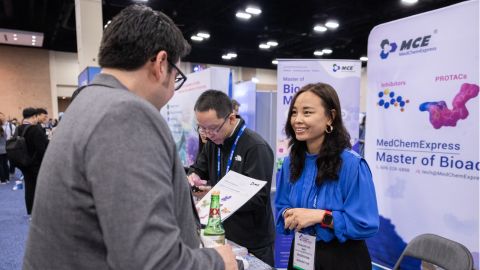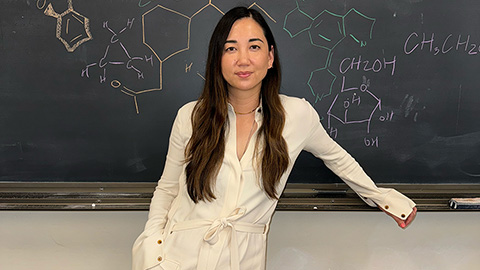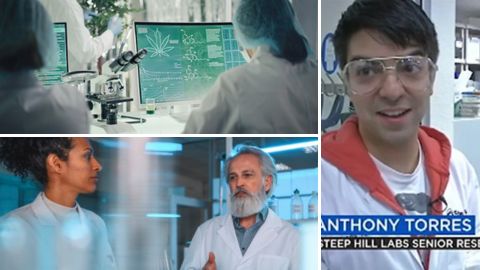‘With protein biochemistry … you can survive anywhere.’
For graduate school, Manjunath Basavaraj traveled from his hometown of Bangalore to the Norwegian city of Tromsø, north of the Arctic Circle and 1,400 miles from the North Pole. “I left after my Ph.D. because of the dark period: From November to February, you don’t see any sun,” he said. In the milder climate of Philadelphia, he landed industry funding for a postdoc in blood clotting. With that experience, a transition to industry was surprisingly smooth: Now, at Takeda, he continues to work on hemostasis and thrombosis. This interview has been condensed and edited.

Name: Manjunath Goolyam Basavaraj
Current position: Project lead, rare disease drug discovery, Takeda
First job outside of academia: Scientist, rare disease drug discovery, Takeda
Favorite molecule: Tissue factor pathway inhibitor, or TFPI, a serine protease inhibitor involved in blood clotting
You work to develop anticoagulants. Tell me about this kind of drug and when it’s used?
Blood clotting is a basically natural, healthy phenomenon. The problem is when it happens inside the arteries or veins: It can stop blood flow to heart or brain. In this situation, physicians use anticoagulants.
The clotting system is complex, involving about 12 factors. Each anticoagulant that we have targets different factors in a different way. These drugs stop pathogenic blood clots but also affect clot formation necessary to stop bleeding. We need novel anticoagulants — which research scientists call the Holy Grail — to stop clots inside the blood vessels but not affect the normal clotting process.
What got you interested in clotting?
Actually, it was personal: My father had a stroke. After my master’s in India, I wanted to do a Ph.D. on stem cells. But after the stroke and everything, I felt like, Why not do research with a personal connection?
However, there were very few labs in India that were doing this research. So I had to go outside, either to the U.S. or Europe. So that’s how I ended up going to Norway to a lab where they work on thrombosis.
Tell me about your transition into industry?
I was more interested in academia than industry as a postdoc. But time decides a lot of things. Finally, I realized the academic career was not for me. Becoming independent faculty is really difficult. I realized that really successful academic researchers do three or four years of postdoc, then transition. If that does not happen, that means you’re not there.
The time you spend in industry is really well worth it; every year of experience adds. Whereas in academia, it sort of has diminishing or maybe even negative returns.
I see people who are really successful academics spending all their time (on work). If that is your goal for your life, great. But if you want a personal life at the same time as the career, I think industry is the best place.
Did having industrial funding as a postdoc help you get a foot in the door?
Definitely. After getting the two grants, I had more confidence and felt the work I was doing was really valuable. The funding also helped me in interviews when I applied at Takeda.
It’s important that the work you do as a Ph.D. and postdoc be relevant to industry so that you can find a company that is doing similar work. With protein work and enzyme kinetics, biochemistry, you can survive anywhere.
This is the first position I applied for. I was lucky; they were looking for exactly the same experience I had. My mentor said, “It is not easy going directly from postdoc to Big Pharma without industrial experience.”
What does promotion look like in industry?
It depends on your direct manager but also on experience in the specific field and how competent you are. It is important to play a significant role in project progress and interact with people and actively participate in meetings to learn and progress. One thing that surprised me is that a majority of the people in industry change (or have to change) jobs to get promoted to the next level.
Before coming here, I thought industry was a completely different world. It may be true for other divisions, but R&D is exactly like academia. I’m doing almost the same research, using the same techniques. But compared to academia, there is no problem with funding. We don’t need to write an NIH grant. There is money; we just use it.
Every career has its own pluses and minuses. Even though it’s difficult, if you’ve become faculty, you have a lot of freedom to study what you want, whereas here it’s more predetermined. You can always propose research, but to become realistic, it takes a lot of time. But as long as you really love research, it doesn’t matter which disease or which work you do.
(Would you like to suggest an ASBMB member who works in industry for a Five Questions interview? Send an email to ASBMB Today.)
Enjoy reading ASBMB Today?
Become a member to receive the print edition four times a year and the digital edition monthly.
Learn moreGet the latest from ASBMB Today
Enter your email address, and we’ll send you a weekly email with recent articles, interviews and more.
Latest in Industry
Industry highlights or most popular articles

Black excellence in biotech: Shaping the future of an industry
This Black History Month, we highlight the impact of DEI initiatives, trailblazing scientists and industry leaders working to create a more inclusive and scientific community. Discover how you can be part of the movement.

Attend ASBMB’s career and education fair
Attending the ASBMB career and education fair is a great way to explore new opportunities, make valuable connections and gain insights into potential career paths.

Benefits of attending a large scientific conference
Researchers have a lot of choices when it comes to conferences and symposia. A large conference like the ASBMB Annual Meeting offers myriad opportunities, such as poster sessions, top research talks, social events, workshops, vendor booths and more.

Biotech startup worms its way into therapeutics
Andrea Choe's company, Holoclara, has created an anti-inflammatory drug based on a molecule from worms.

How military forensic scientists use DNA to solve mysteries
Learn how two analysts at the Armed Forces DNA Identification Laboratory use molecular biology and genetics to identify the remains of fallen troops.

Careers in industry: A year in review
Careers columnist Inayah Entzminger looks back at 12 months of interviews, advice and lists of resources.

